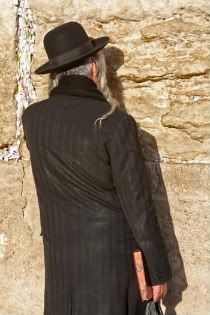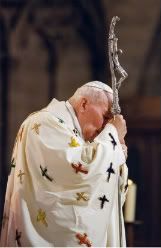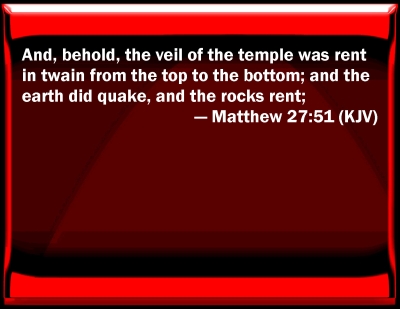 |
 |
Posted on 11/28/2009 8:50:02 AM PST by Teófilo
continued from Part I
 |
 |
Before we continue, let us check my assumptions: first, and as I stated before, I am assuming that post-Biblical, post-second Temple Judaism developed independently from, and in many instances in opposition to, Christianity: it is then to be expected that many commonalities as well as many differences came to the fore after 2,000 years of separate development. Second, I only had a chance to peruse a very small number of Jewish primers on prayer and they all seem to me to emphasize liturgical prayer, whether in a synagogue or in a home setting. Third, although I was unable to find primers discussing personal prayer as an intimate relationship between God and the believer in Jewish life, absence of evidence is not evidence of absence, it’s just that my initial and very preliminary survey turned up none. Fourth, I have never attended, nor – absent a formal invitation by a person with standing who knows my intentions – plan to attend a Jewish synagogue service any time soon. What I speak of here has been gleaned indirectly, solely from book reading. With these things in mind, let us proceed.
Theme #1: Priority of Jewish Identity
Post-biblical, post-second Temple, rabbinical Judaism – Judaism as we more or less meet it today in its manifold expressions – emphasizes the liturgical over the spontaneous and the corporate over the individual in a way that the also liturgical and corporate-conscious Catholic Church does not. The Jewish synagogue liturgy – again, in its various Orthodox, Conservative, and Reform settings – aims to forge, nurture, and maintain a Jewish national consciousness through space and time. The worship of Israel’s God can’t take place without first restoring and reestablishing the Jewish identity of the worshipping assembly. This is done through the prayers themselves.
Jewish corporate prayer then assumes an exclusive stance that does not translate perfectly to our own notion of excluding catechumens and non-Catholic Christians from participating in the Eucharist. Jews are Jews first and foremost “genetically,” or like St. Paul once said “according to the flesh.” According to Jewish authorities, a Jew is always a Jew – unless he or she becomes a Christian. This sense of identity and belonging is reinforced constantly through their worship.
The best comparison I can make would be to imagine a “liturgy” in which our identity as Americans formed the unmovable tapestry against which the worship service takes place, through “liturgical” readings of the Declaration of Independence, the Constitution, the Bill of Rights, and the Gettysburg address, punctuated by patriotic songs and anthems and remembrances of our national milestones. This sense of national belonging, of common purpose, origin, and destiny, is exactly what their liturgy is meant to evoke to a Jew as they worship the God of Abraham, Isaac, and Jacob.
Instead, we Catholics tend to think of God and the new Israel as “transnational” in nature. The focus of our allegiance has shifted to Jesus as the embodiment of the New Israel around whom we gather to encounter the God of Israel. Our national identities have been subsumed and our consciousness of being a People of God sprouts from this recognition of Jesus as the embodiment of Israel.
Theme #2: A different notion of individual prayer
The primary mode of Jewish prayer in the home, individually or in family, seems to be formulaic and liturgical even there – and I say this fully conscious that in many instances, that’s our case too. But what I mean is that whereas Catholic home prayer may turn into individual opportunities for meditation, mental prayer, and contemplation, post-biblical Jewish home prayer or individual prayer rarely transcends the meaning and the occasion of the prescribed prayers because the observance itself is a sufficient vehicle for intimacy with God, a beginning, a springboard, and a vehicle, a medium.
For example, structured meditative prayers like the Rosary or the Chaplet of Divine Mercy seem to me inconceivable in a Jewish context and, if there are analogues, I freely admit my ignorance as to what these might be. I also note that I’ve seen little in postbiblical Jewish literature – and again, my research has not been exhaustive – about the practice of spontaneous, “glory and praise” individual prayer leading to silent contemplation due in part to a Jewish aversion towards “repetitive prayer” that even includes repetitive praise, and a different notion on God’s transcendence that apparently places insurmountable obstacles to a Catholic-like contemplative journey: Jews conceive of intimacy with God in more restricted terms than we do. This takes me to the next theme.
Theme #3: A different notion of intimacy with God
If I were to encapsulate Jewish theology in one catchphrase, I would say that Jewish theology is “a theology of boundaries” between man and his Lord that cannot be crossed. Let me illustrate:
·"Do not come any closer," God said. "Take off your sandals, for the place where you are standing is holy ground." – Exodus 3:5By way of contrast, Christian theology may be defined as one of “no boundaries” between God and man. For example:
·But," he said, "you cannot see my face, for no one may see me and live." – Exodus 33:20
·Then I will remove my hand and you will see my back; but my face must not be seen." – Exodus 33:23
·The LORD spoke to Moses after the death of the two sons of Aaron who died when they approached the LORD. 2 The LORD said to Moses: "Tell your brother Aaron not to come whenever he chooses into the Most Holy Place behind the curtain in front of the atonement cover on the ark, or else he will die, because I appear in the cloud over the atonement cover. – Leviticus 16:1-2
·At that moment the curtain of the temple was torn in two from top to bottom. – Matthew 27:51 (also Mark 15:38 and Luke 23:45)The boundaries, barriers, and enclosure clearly set by God in the Hebrew Scriptures have been removed for us by Jesus in the New Testament, but for Jews, the ancient boundaries between God and man, between Creator and creature, still stand.
·No one has ever seen God, but God the One and Only, who is at the Father's side, has made him known. – John 1:18
·Philip said, "Lord, show us the Father and that will be enough for us." Jesus answered: "Don't you know me, Philip, even after I have been among you such a long time? Anyone who has seen me has seen the Father. How can you say, 'Show us the Father'? Don't you believe that I am in the Father, and that the Father is in me? The words I say to you are not just my own. Rather, it is the Father, living in me, who is doing his work. – John 14:8-10
·Therefore, since we have a great high priest who has gone through the heavens,[a] Jesus the Son of God, let us hold firmly to the faith we profess. For we do not have a high priest who is unable to sympathize with our weaknesses, but we have one who has been tempted in every way, just as we are—yet was without sin. Let us then approach the throne of grace with confidence, so that we may receive mercy and find grace to help us in our time of need. – Hebrews 4:14-16
Anyone who has read Martin Buber’s I and Thou knows what I mean. If I were to point out a book on Jewish mysticism this would be it, although Buber didn’t intend it to be about mysticism, but about ethics. A most excellent book about how we experience the world through relationships and, through these relationships, we experience God. And yet, throughout the book, man remains at a “respectful” distance from a God who can’t and won’t be “thingified” into any created reality, including the Incarnation – much less “transubstantiation.” Man can approach God infinitely and be enriched by the endless approach, but the ultimate boundary still stands: man will never be conformed to the divine nature.
Since for Catholic Christians the boundaries have dropped, our experience of contemplative prayer has developed a vocabulary of “quest,” ascent, and union with God in the order of grace. We find this “grammar of ascent” in the New Testament itself:
·"My prayer is not for them alone. I pray also for those who will believe in me through their message, all of them may be one, Father, just as you are in me and I am in you. May they also be in us so that the world may believe that you have sent me. I have given them the glory that you gave me, that they may be one as we are one: I in them and you in me. May they be brought to complete unity to let the world know that you sent me and have loved them even as you have loved me. – John 17:20-23To these we may add the promises made by Jesus as recorded in the Book of Revelation, promises which entail the full participation by the follower of Jesus in Jesus’ own messianic privileges and dignities.
·…God is love. Whoever lives in love lives in God, and God in him. In this way, love is made complete among us so that we will have confidence on the day of judgment, because in this world we are like him. There is no fear in love. But perfect love drives out fear, because fear has to do with punishment. The one who fears is not made perfect in love. – 1 John 4:16-18
·Through these he has given us his very great and precious promises, so that through them you may participate in the divine nature and escape the corruption in the world caused by evil desires. – 2 Peter 1:4
All these ideas, although fully Jewish in their origin and symbolism, represent completely original thoughts, boldly encroaching upon the boundaries set in the Previous Testament. Works like The Ladder of Divine Ascent, The Cloud of Unknowing, The Interior Castle, and The Ascent of Mount Carmel would be foreign to post-Biblical Jewish thought. Jewish mysticism flowed through quite different channels, from the Merkabah to Hassidism, all of them vessels of communion with the God of Israel but all of them leery of approaching God in the familiar, unitive, even nuptial terms opened up by Jesus and experienced and described by Christian theologians ever since.
So, what are we to make of all these convergences and divergences? Where do we stand? That will be the subject of the next post, the conclusion of this “series within the series” of Jewish and Christian themes in Christianity.
Bump for faith study.

I mis-read the title.
I thought it said “party like a jew”.
This old notion that Jews and Christians are enemies is from Satan. Christians have had The Holy Spirit reveal the Truth, that Jesus is who He said He was, and is the only mediator between God and man. Jews are our brothers and we are to steadfastly pray for them, pray for Jerusalem, and protect them from harm.
No one is required to believe that, but no one is required to be in paradise with God. If you confess you are a Christian, you are taking on the chosen people as your family. We didn't make that choice, God did. Jews have been chosen by God to reveal His Son to the world, even if they are in rebellion to Him.
Whenever you hear the old question, "Did the Jews kill Christ, or the Romans?", just know that is straight from Satan because Jesus Himself said "no one takes His life, He gives it willingly."
If a Catholic cannot pray like a Jew, who are they praying to? Muslims pray to someone. Their god requires them to kill and doesn't guarantee them paradise unless they do. Their god judges them on works rather than Grace. Their god doesn't recognize Jesus as the Son Of God.
You can pray to a stick, or a rock carving, or anything else, but there is One True God, that is God. There is but one Mediator, and that is Jesus. Praying to a thing, a statue, or a dead person is blasphemy in the eyes of God.
Then my answer would be: absolutely.
Did you even read what I wrote? Where did you stop?
-Theo
Then my answer would be: absolutely.
All right, then. But remember, that also means you have the guilt that goes along with the partying. ;-)
The biggest contribution Judaism made to Christianity in general and to Catholicism in particular was GUILT.
So even there we're on an even plane! (LOL!)
-Theo
Bump !
Disclaimer: Opinions posted on Free Republic are those of the individual posters and do not necessarily represent the opinion of Free Republic or its management. All materials posted herein are protected by copyright law and the exemption for fair use of copyrighted works.